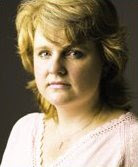Magic in fiction
My sister and brother-in-law are vicars and we sometimes talk about how sad it is that clergypeople on television are so often portrayed as perverted and sinister and/or spineless and grovelling. (The Vicar of Dibley is an obvious and welcome exception.)
I find it interesting also to see how magicians are portrayed in fiction. I don't mean magick fiction, because that's not really my cup of tea and I don't read it (although I do like magic realism but that's another story, as it were). I mean books and films about conjurors.
There seems to be quite a lot of variety as regards fictional magicians: some are rather foolish (Mitchell & Webb's Magicians, Adam Klaus in Jonathan Creek), many are ruthless (the rivals in The Prestige, Henri Lambert in The Magician's Wife, the magician behind The Magician's Tale), some are weak and a bit annoying (Marty Quick in 52 Ways to Magic America, William Wilson in The Bullet Trick), a few are downright criminal (The Vanished Man) and others are just weird (as in The Spirit Cabinet). The magician tends to emerge as more of a hero if he's based on someone who actually lived (Carter Beats the Devil, The War Magician).
In many cases, the magician's whole life is shrouded in mystery, and the fact that he has made a career out of conjuring is just an extension of - and a metaphor for - his living a life of illusion (Jennifer Johnston's Illusionist, Parsifal in Ann Patchett's The Magician's Assistant). I like this angle - as, I believe, does my friend Marc Oberon. He has lent and given me several books about magicians and is a somewhat mysterious character himself.
Labels: family, magic in fiction, marc oberon


0 Comments:
Post a Comment
Subscribe to Post Comments [Atom]
<< Home